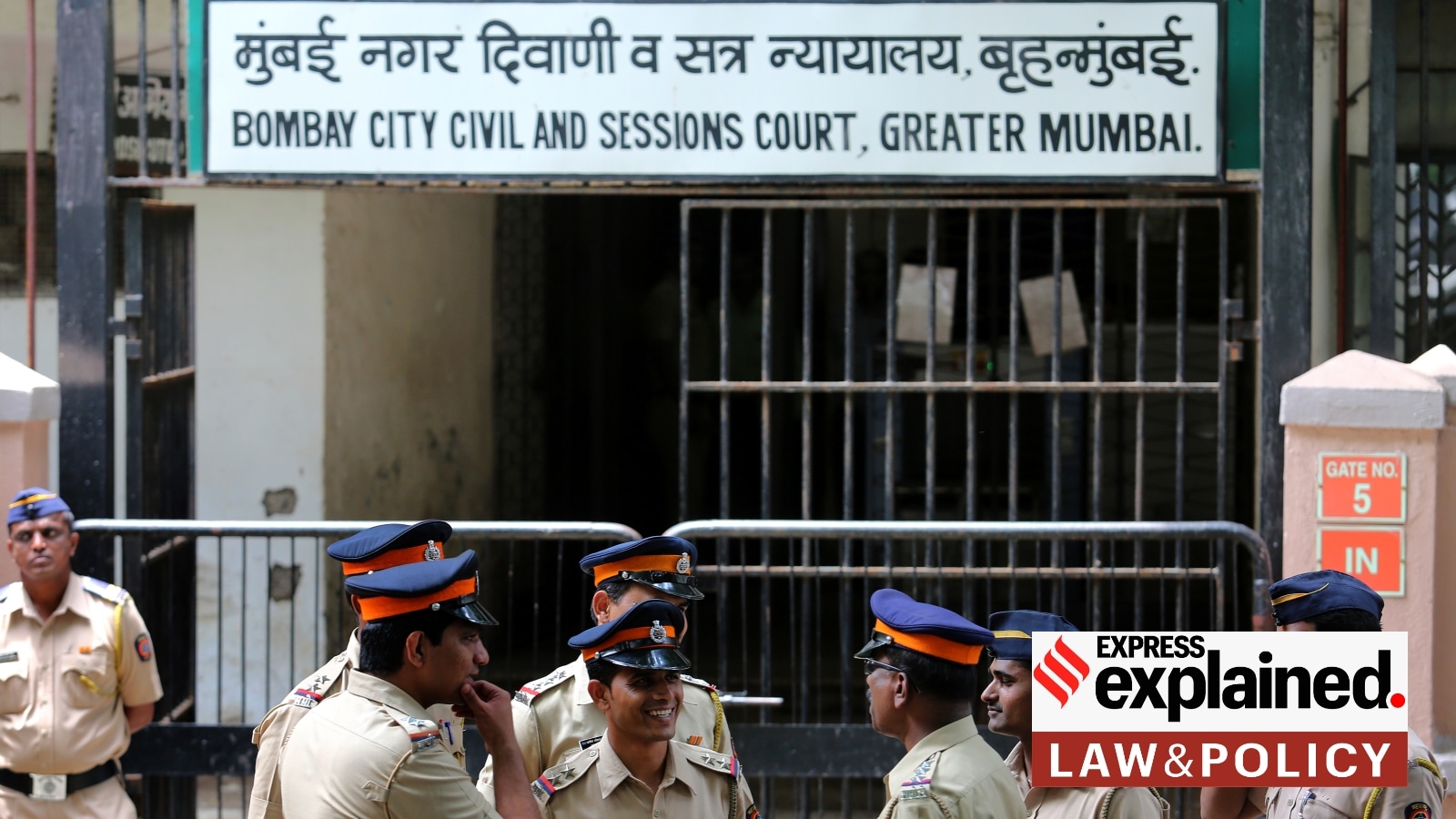What is the difference between civil & criminal cases?
The Supreme Court has recently intervened in two instances in which High Courts allowed criminal proceedings to continue in civil disputes. The distinction between civil and criminal law is fundamental in India’s legal system
 Police stands guard outside the Bombay Sessions Court during the 1993 bomb blast verdict in 2017. (Prashant Nadkar)
Police stands guard outside the Bombay Sessions Court during the 1993 bomb blast verdict in 2017. (Prashant Nadkar)In the last two weeks, the Supreme Court has twice intervened in instances in which High Courts allowed criminal proceedings to continue in what were essentially civil disputes.
On Wednesday, a Bench of Justices J B Pardiwala and R Mahadevan set aside a Rajasthan HC order that had denied pre-arrest bail to a couple in a case involving an unpaid sum for a plywood consignment. “There is no question of criminal breach of trust once there is a sale transaction. This is a settled position of law,” Justice Pardiwala had said.
On August 4, the same Bench stripped a judge of the Allahabad HC of his criminal roster for allowing criminal proceedings in a case of an unpaid business transaction. The apex court had called the HC’s reasoning “shocking” and a “mockery of justice”. After the Chief Justice of India intervened, the Bench on August 8 recalled its directive that the Allahabad HC judge never be assigned a criminal case.
Civil & criminal law
The distinction between civil and criminal law is fundamental in India’s legal system. They differ in terms of their purpose, parties involved, and procedure.
Civil law is designed to resolve disputes between private individuals or organisations. Civil cases, known as suits, typically involve disagreements over rights and duties of the parties to the case towards each other. The goal is not to punish but to provide a remedy, usually in the form of monetary compensation (called damages) or a specific action ordered by the court to a party to do or not to do something (called an injunction).
Examples of civil cases include property disputes, contract breaches, family law matters like divorce and child custody, and cases for recovery of money. In a civil suit, the person who files the case is called the plaintiff, and the person against whom it is filed is the defendant.
Criminal law deals with acts that are considered offences against the state or society as a whole. The objective is to punish the offender and deter others from committing similar crimes. The state, represented by a prosecutor, initiates criminal proceedings against the accused. If found guilty, the accused can face penalties ranging from fines to imprisonment and even death. Offences like theft, cheating, assault and murder fall under criminal law.
A key distinction between civil and criminal cases is with regards to the burden of proof. In a civil case, the plaintiff must prove their case on a “preponderance of probabilities”, meaning their version of events is more likely to be true than the defendant’s. In a criminal case, the prosecution has the much higher burden of proving the guilt of the accused “beyond a reasonable doubt”. This higher standard reflects the serious consequences of criminal conviction, which can involve the loss of liberty.
Some actions can give rise to both civil and criminal proceedings. For instance, in the two aforementioned cases before the SC, it was alleged that both a breach of contract, which is a civil wrong, and cheating and breach of trust, both criminal offences, had occurred. The SC decided that there was no demonstrable criminal element to justify the criminal proceedings; if criminal intent to defraud had been present prior to entering a commercial relationship, simultaneous civil and criminal proceedings would have been justified.
Length of proceedings
A common perception — one that was noted by the Allahabad HC judge in his subsequently overruled order — is that civil proceedings are significantly more time-consuming than criminal trials. And prima facie, data from the National Judicial Data Grid (NJDG) for district courts across India support this notion. As of August 14, 2025, 70.17% of criminal trials were disposed of within a year, while only 37.91% of civil suits were resolved in the same timeframe.
The nature of both kinds of cases has a role to play in civil cases taking longer, according to Surya Prakash B S, program director at DAKSH, a think-tank focused on law and justice system reforms.
“In criminal cases, there is life and liberty involved,” he told The Indian Express, suggesting a greater sense of urgency. In contrast, “in civil matters, parties may drag proceedings in the hope of arriving at an out-of-court settlement”. DAKSH’s research on Bangalore courts found that many civil cases get stuck at the preliminary stage of issuing notices and summons.
However, Prakash cautioned against drawing simple conclusions from such data.
Shreya Tripathy, a senior resident fellow at the legal policy think tank at Vidhi Centre for Legal Policy pointed out the difficulty in tracking cases through the system. “A case which might show as disposed for a district court could very well end up being appealed against in the High Court, where it will be shown as a separate, pending case,” she told The Indian Express. This makes it hard to determine the total time taken from filing to final resolution, she said.
Data from the NJDG also shows variations depending on the specific type of case. For instance, while civil suits take an average of 4.91 years for disposal, execution petitions, filed to enforce a court order in a civil case, take about 3.97 years to conclude.
Bail applications in criminal cases are decided in about 6.12 months on average. However, criminal sessions court cases involving allegations of serious criminal offences take an average of 4.65 years, which is comparable to the time taken for civil suits.
Magisterial criminal cases, involving lighter criminal offence punishable by not more than three years’ imprisonment, last 2.45 years on an average.
- 01
- 02
- 03
- 04
- 05






































